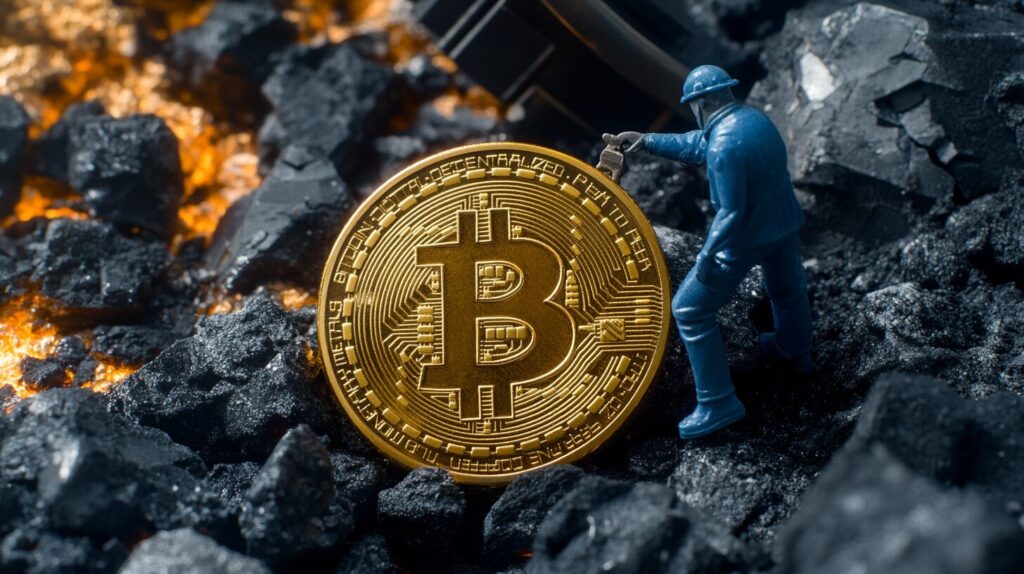Mining pool in cryptocurrency refers to a collaborative group of miners which can combine their computational resources to expand the chances of successfully mining a block and earning rewards. This approach has become increasingly popular as the difficulty of mining cryptocurrencies like Bitcoin has grown, making solo mining less profitable for individual miners.
Definition, Meaning, and Example of a Mining Pool
A mining pool is considered as a collective group of crypto miners who pool their computational resources to solve cryptographic problems, and mine blocks more efficiently. In this setup, the pool participants share their processing power over a network to reduce the variance in mining rewards. When the pool mines a block successfully, the rewards are distributed among the participants according to their contributed computational power.
Example: If a mining pool successfully mines a Bitcoin block worth 6.25 BTC, and a miner contributes 10% of the pool’s total hash power, that miner would receive 0.625 BTC as their share.
What is the Role of a Mining Pool?
The primary role of a mining pool is to increase the chances of mining a cryptocurrency block by pooling together the computational resources of multiple miners. This collaboration is especially beneficial for smaller miners who lack the expensive hardware required to mine blocks independently. The pool manages the distribution of tasks, submits completed work to the blockchain network, and ensures that the rewards are fairly distributed among its members.
How Does a Mining Pool Work in Crypto Mining?
Mining pools function by assigning specific tasks to each participant. Instead of individual miners attempting to solve complex algorithms alone, the pool divides the problem into smaller, more manageable pieces. Each miner works on their assigned piece, and once a solution is found, it is submitted by the pool to the blockchain. The pool then receives the reward for mining the block, distributed to its members according to the amount of work they contributed. It is often calculated using a metric called “share.”
Benefits and Disadvantages of Mining Pools
Benefits:
- Increased Chances of Success: Pooling resources increases the likelihood of successfully mining blocks and earning rewards.
- Steady Income: Mining pools provide a more consistent income for miners compared to solo mining, where rewards are rare and unpredictable.
- Lower Entry Barrier: Miners with less powerful hardware can still participate and earn rewards by joining a pool.
Disadvantages:
- Shared Rewards: Pool participants must share the rewards with others, which may result in lower individual earnings than solo mining.
- Centralization Risk: Large mining pools can contribute to the centralization of the network, reducing the decentralization that cryptocurrencies aim to achieve.
- Fees: Many mining pools charge fees, which can eat into the miners’ profits.
What are Mining Pool Methods?
Mining pools typically use different methods to distribute the work and rewards among their participants. Some of the most common methods include:
- Pay-Per-Share (PPS): Miners are paid a fixed amount for each share they contribute, regardless of whether the pool successfully mines a block.
- Proportional: Rewards are distributed based on the proportion of shares each miner contributes after a block is mined.
- Pay-Per-Last-N-Shares (PPLNS): Rewards are distributed based on the number of shares a miner has contributed over the last N shares, making it more favorable for long-term participants.
- Solo Mining: This is not a pool method but an alternative where individual miners work alone, without sharing resources or rewards.
Why Do You Need a Mining Pool?
Joining a mining pool is essential for most individual miners because it increases the likelihood of earning rewards. Mining cryptocurrencies independently has become increasingly difficult due to the high computational power required. By joining a pool, miners can collaborate and share both the workload and the rewards, ensuring a more consistent and potentially profitable mining experience.
How to Pick a Mining Pool?
When choosing mining pools, miners should consider several factors:
- Pool Size: Larger pools have a higher likelihood of mining blocks but offer smaller individual rewards due to more participants.
- Fees: Consider the fees charged by the pool, which can vary and impact overall profitability.
- Payout Structure: Understanding how the pool distributes rewards is crucial. Choose a method that aligns with your mining goals and resources.
- Reputation: Research the pool’s reputation within the crypto community. Reliable pools are transparent and fair in their operations.
- Location: Some pools are geographically restricted, so it’s important to choose one that is accessible from your region.
Do Mining Pools Make Money?
Yes, mining pools can be profitable both for the operators and the participants. Pool operators typically earn a profit by charging fees for the services they provide, such as task distribution and reward management. Participants in the pool earn money based on the amount of computational power they contribute. However, profitability depends on factors like the cryptocurrency being mined, the pool’s efficiency, and the current market conditions.
Which Crypto Mining Pool is Most Profitable?
The profitability of a mining pool varies depending on the cryptocurrency being mined, the pool’s size, fees, and payout structure. For example, some of the most profitable Bitcoin mining pools include F2Pool, Antpool, and Slush Pool. However, the profitability of these pools can fluctuate based on changes in hash rates, fees, and market conditions. It’s important for miners to regularly assess the performance and profitability of their chosen pool.
How Do Mining Pools Pay?
Mining pools pay their participants based on their payout structure, such as PPS, Proportional, or PPLNS. Payments are usually made using cryptocurrency that is mined directly into the miner’s wallet. Some pools offer more frequent payouts, while others may require a minimum threshold before making a payment. Miners need to understand the pool’s payment policies to ensure they align with their expectations.




